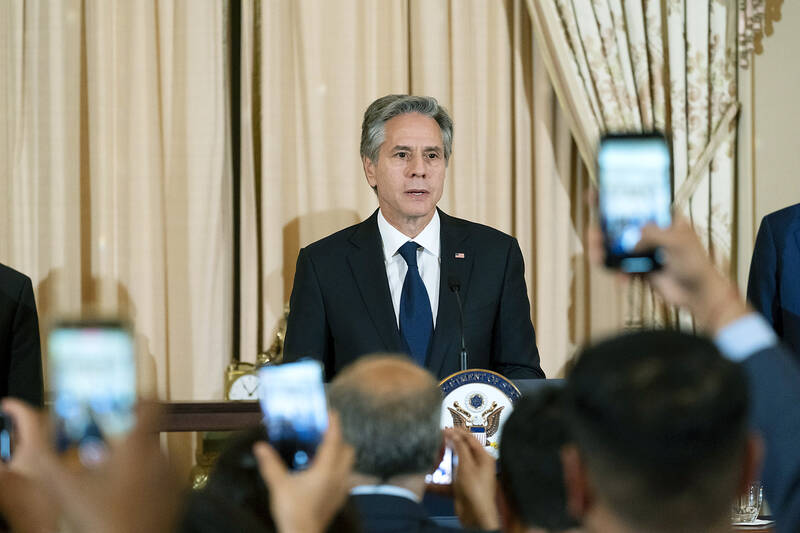US Secretary of State Antony Blinken on Wednesday accused China of undermining a decades-old “status quo” that has kept Washington and Beijing from going to war over Taiwan, saying China was trying to “speed up” its seizure of the nation.
“What’s changed is this — a decision by the government in Beijing that that status quo was no longer acceptable, that they wanted to speed up the process by which they would pursue reunification,” Blinken said in an interview at Bloomberg’s offices in Washington.
“They also, I think, made decisions about how they would do that, including exerting more pressure on Taiwan, coercion — making life difficult in a variety of ways on Taiwan in the hopes that that would speed reunification,” he said.

Photo: AP
The latest comments from the top US diplomat rebuking China over Taiwan expand on Blinken’s statements from last week that China might seize Taiwan on a “much faster timeline” than previously thought.
Blinken’s latest criticism, part of a broader war of words between Washington and Beijing, also came shortly after Beijing wrapped up its twice-a-decade Chinese Communist Party congress, which saw Chinese President Xi Jinping (習近平) consolidate his power.
Taiwan remains the key flash point and the most likely source of conflict between the US and China. Tensions over the nation spiked dramatically when US House of Representatives Speaker Nancy Pelosi defied Beijing’s warnings and visited Taipei in August.
Blinken said the US and China were now clearly engaged in a global competition to shape international affairs, with Beijing pushing back against the US to champion an “illiberal” world order.
“We don’t look for conflict. We don’t want a cold war. We’re not trying to contain or restrain China,” Blinken said. “But equally, we’re resolute in standing up for our interests, standing up for our values. And again, when it comes to Taiwan, standing up for the proposition that’s held for decades, that these differences need to be managed and resolved peacefully.”
In Taipei, Ministry of Foreign Affairs (MOFA) spokeswoman Joanne Ou (歐江安) slammed China for conducting military drills in Taiwan’s airspace and waters around the nation since August, saying that the drills raised cross-strait tensions without any provocation.
The US government has issued multiple joint statements with like-minded countries to show its concern for peace and stability in the Taiwan Strait, she said, adding that Taiwan is to continue strengthening its self-defense capabilities, the security partnership with the US, and cooperation with Japan and other like-minded partners to defend the country’s sovereignty, democratic way of life, peace and an international order based on shared values.
Mainland Affairs Council Deputy Minister Chiu Chui-cheng (邱垂正) said the government is “steadfast in the defense of national sovereignty, freedom and democracy without any room for compromise.”
The government insists on a free and democratic constitutional order, a mutually non-subordinate relationship with China, sovereignty and determining the future of the country with Taiwanese representing the social consensus in the nation, he said, adding that there can be no compromises on the four issues.
Additional reporting by Chen Yu-fu

INVESTIGATION: The case is the latest instance of a DPP figure being implicated in an espionage network accused of allegedly leaking information to Chinese intelligence Democratic Progressive Party (DPP) member Ho Jen-chieh (何仁傑) was detained and held incommunicado yesterday on suspicion of spying for China during his tenure as assistant to then-minister of foreign affairs Joseph Wu (吳釗燮). The Taipei District Prosecutors’ Office said Ho was implicated during its investigation into alleged spying activities by former Presidential Office consultant Wu Shang-yu (吳尚雨). Prosecutors said there is reason to believe Ho breached the National Security Act (國家安全法) by leaking classified Ministry of Foreign Affairs information to Chinese intelligence. Following interrogation, prosecutors petitioned the Taipei District Court to detain Ho, citing concerns over potential collusion or tampering of evidence. The

Seventy percent of middle and elementary schools now conduct English classes entirely in English, the Ministry of Education said, as it encourages schools nationwide to adopt this practice Minister of Education (MOE) Cheng Ying-yao (鄭英耀) is scheduled to present a report on the government’s bilingual education policy to the Legislative Yuan’s Education and Culture Committee today. The report would outline strategies aimed at expanding access to education, reducing regional disparities and improving talent cultivation. Implementation of bilingual education policies has varied across local governments, occasionally drawing public criticism. For example, some schools have required teachers of non-English subjects to pass English proficiency

‘FORM OF PROTEST’: The German Institute Taipei said it was ‘shocked’ to see Nazi symbolism used in connection with political aims as it condemned the incident Sung Chien-liang (宋建樑), who led efforts to recall Democratic Progressive Party (DPP) Legislator Lee Kun-cheng (李坤城), was released on bail of NT$80,000 yesterday amid an outcry over a Nazi armband he wore to questioning the night before. Sung arrived at the New Taipei City District Prosecutors’ Office for questioning in a recall petition forgery case on Tuesday night wearing a red armband bearing a swastika, carrying a copy of Adolf Hitler’s Mein Kampf and giving a Nazi salute. Sung left the building at 1:15am without the armband and apparently covering the book with a coat. This is a serious international scandal and Chinese

TRADE: The premier pledged safeguards on ‘Made in Taiwan’ labeling, anti-dumping measures and stricter export controls to strengthen its position in trade talks Products labeled “made in Taiwan” must be genuinely made in Taiwan, Premier Cho Jung-tai (卓榮泰) said yesterday, vowing to enforce strict safeguards against “origin laundering” and initiate anti-dumping investigations to prevent China dumping its products in Taiwan. Cho made the remarks in a discussion session with representatives from industries in Kaohsiung. In response to the US government’s recent announcement of “reciprocal” tariffs on its trading partners, President William Lai (賴清德) and Cho last week began a series of consultations with industry leaders nationwide to gather feedback and address concerns. Taiwanese and US officials held a videoconference on Friday evening to discuss the